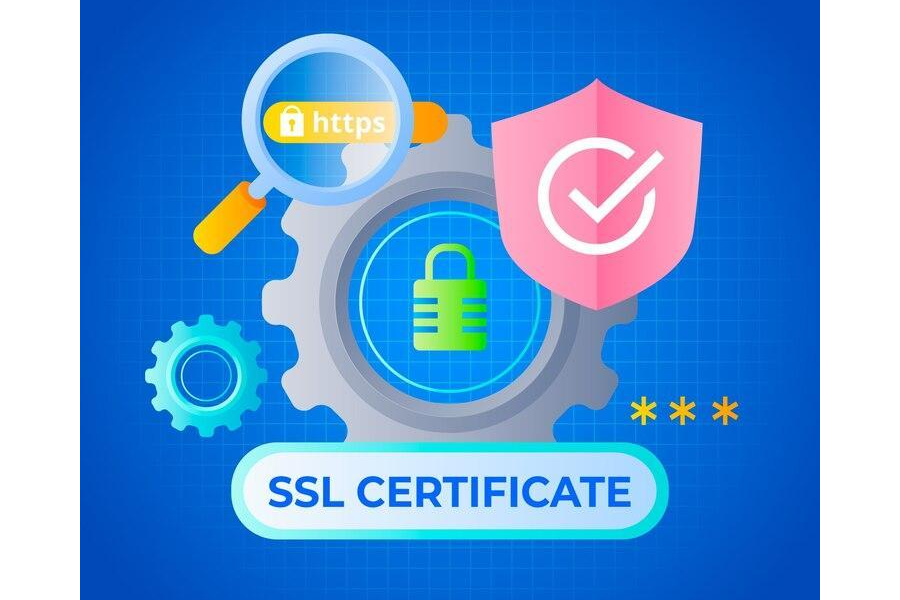As an online store owner, the security of your online platform should be your main focus. In an era where cyber threats are on the rise, you will need to do everything possible to ensure that you protect your customers’ sensitive data.
It is not just a security measure but a crucial business strategy. This comprehensive guide will provide you with all the information you need to know about SSL certificates and their role in the e-commerce security landscape.

What Is a SSL Certificate and How Does It Work
SSL (Secure Sockets Layer) certificates are digital passes that initiate encrypted connections between web browsers and servers. This encryption ensures that the data transferred remains confidential and tamper-free.
An SSL certificate essentially serves as a protective envelope, shielding crucial information like credit card numbers and login credentials from prying eyes.

When a customer enters an SSL-secured website, the browser checks the SSL certificate’s validity. Upon verification, it creates an encrypted link, indicated by ‘https://’ and a padlock symbol in the address bar of a browser.
SSL works by making one key of the pair (the public key) known to the outside world, while the other (the private key) remains a secret only you know. Therefore, this visible assurance, also known as the public key, is your first line of defense and a sign of credibility for customers.
The private key is also for you to prevent criminals from impersonating you. It is important to remember that the HTTPS in the URL works to protect the communications between visitors and a web server from being intercepted by cyber attacks.
SSL certificates are necessary for establishing this encrypted connection.

The Importance of SSL Certificates in E-commerce
In e-commerce, the stakes are high. This means that you cannot afford to make errors because a single breach can significantly tarnish your brand’s reputation. In that case, you need an SSL certificate to act as your storefront’s electronic security guard.
There are several benefits of SSL certificates for your e-commerce store:
- Data Protection: SSL certificates safeguard data integrity by preventing unauthorized parties from intercepting sensitive information.
- Trust and Confidence: The presence of SSL reassures visitors that your site is secure. This fosters trust which is a currency in the realm of online shopping. A trust seal can further enhance this sentiment, affirming your site’s legitimacy to visitors and customers.
- Increased Security: SSL encryption ensures that data transmitted between users and your website remains private and protected. It gives you the highest level of security you can ever need as an ecommerce website owner.
- Improved SEO: SSL is a ranking factor for search engines, helping your website to appear higher in search results and drive more organic traffic.
- Compliance with Regulations: SSL is a requirement for websites that handle sensitive customer data, ensuring compliance with data protection laws.
Finally, when you implement SSL on your website this will not only boost user confidence and comfort but also can potentially drive higher engagement and conversions.

Types of SSL Certificates: Which One Is Right for Your Online Store?
There are various types of SSL certificates. In the following paragraphs, we will briefly discuss them as well as the validation levels for SSL vetting procedures.
The types of SSL certificates are:
- Single domain SSL Certificates: As the name suggests, a single-domain SSL certificate applies to only one domain and cannot be used to authenticate any other domain.This means that it cannot even be used to authenticate subdomains of the domain it is issued for. However, it can secure all the pages on the domain it is issued for.
- Multi Domain SSL Certificates: A multi-domain SSL certificate lists multiple distinct domains on one certificate so that domains that are not subdomains of each other can share a certificate. Essentially, they allow a single certificate to secure multiple domains, including subdomains of a single main domain name or entirely different domain names.
- Wildcard SSL Certificates: A Wildcard SSL certificate is issued for a single domain and all its subdomains. A subdomain falls under the umbrella of the main domain and a main domain can have multiple subdomains. For example, if your main domain is www.mydomain.com, your subdomains can be blog.mydomain.com, customersupport.mydomain.com, etc.
- Unified Communications: A UCC (Unified Communications Certificate) is a certificate capable of securing multiple domains and featured subdomains under a single certificate.
A UCC is also known as SAN (Subject Alternative Name) as a user can add multiple names as the subject of the certificate.
Authentication and Validation Levels
The authentication and validation levels for SSL certificates can be broken down into the following categories:
- Domain Validated (DV) Certificates: Quick to obtain and cost-efficient, DV certificates are suitable for blogs or informational websites where transactions aren’t performed.
- Organization Validated (OV) Certificates: These require more rigorous checks, as they validate the organization’s identity behind the domain. The OV SSL certificate is a good fit for business websites that handle more sensitive customer information.
- Extended Validation (EV) Certificates: Offering the highest security level, an Extended Validation, EV, SSL certificate is ideal for large e-commerce sites demanding stringent authentication procedures.
Analyzing your business needs and budget will guide you to the appropriate SSL certificate.

How to Obtain an SSL Certificate for Your e-commerce Website: A Step-by-Step Guide

Obtaining an SSL certificate is a crucial step in ensuring the security and trustworthiness of your e-commerce business.
This certificate encrypts the communication between your website and its visitors, protecting sensitive information such as personal data and payment details.
In the following paragraphs, we will walk you through the process of obtaining an SSL certificate, providing you with a detailed understanding of each step involved.
- Choose the Right Type of Certificate: It is essential to select the appropriate type of SSL certificate based on the nature and the scale of your e-commerce business. The options range from basic domain validation (DV) certificates to more advanced organization validation (OV) and extended validation (EV) certificates, which offer a higher level of validation and trust.
- Select an SSL Certificate Provider: Take the time to research and choose a Certificate Authority (CA) you can trust as your SSL certificate provider. Look for providers with a strong industry reputation, positive reviews, and excellent customer support. This will ensure that you receive a reliable and trusted SSL certificate for your website.
- Generate a CSR (Certificate Signing Request): To obtain an SSL certificate, you need to generate a Certificate Signing Request. It includes your public key, company information, and domain details. This request will be sent to the CA for validation and issuance of the SSL certificate. Follow the instructions provided by your web server or hosting provider to generate the CSR accurately.
- Submit Your CSR to the CA: If you have generated the CSR, submit it to the selected CA along with any required validation documents. The CA will verify the information provided and may require additional documentation to ensure the legitimacy of your business.
- Install the SSL Certificate on Your Server: After the CA has validated your CSR and completed the issuance process, you will receive the SSL certificate. The Certificate is usually installed on a web server and you will need to follow the installation instructions provided by your web server or hosting provider to install the certificate correctly. This typically involves uploading the certificate files and updating your server configuration.
- Verify the Installation: Once the SSL certificate is installed, perform a thorough verification to ensure that everything is working correctly. Test your website to ensure that it is accessible via ‘https://’ and that there are no security warnings or errors. Additionally, check for the presence of the padlock icon in the browser’s address bar, indicating a secure connection.
By following these steps, you can obtain an SSL certificate for your e-commerce business, enhancing the security and trustworthiness of your website.
Remember to periodically renew your SSL certificate to maintain its validity and continue providing a secure browsing experience to your visitors.

Installing and Configuring an SSL Certificate on Your E-commerce Website: Best Practices and Tips
To get uninterrupted service, you will need to correctly install your SSL certificate on the website you own or manage.
Follow the recommendations below for seamless integration:
- Follow the Certificate Authorities’s Instructions: Certificate Authorities provide detailed guides tailored to various hosting environments.
- Use Automatic Configuration Tools: Some service providers offer tools that simplify the SSL setup process.
- Test Configuration: Tools like Qualys SSL Labs provide free, in-depth analysis of your SSL configuration.
Common SSL Certificate Errors and How to Fix Them
SSL certificate errors can occur in various scenarios.
Here are a few common ones to be aware of:
- Expired SSL Certificate: An expired certificate poses a significant security risk. Make sure to set reminders and renew your SSL certificate well before its expiry date.
- Mismatched Domain Name: When the certificate name doesn’t match the domain, users will encounter warnings. Double-check the accuracy of the certificate issuance.
- Incomplete Certificate Chain: Ensure that all necessary intermediate certificates are properly installed along with the primary SSL certificate.
- Self-Signed Certificate: Browsers often distrust self-signed certificates as they are not issued by a trusted third-party CA. Consider obtaining a certificate from a recognized CA.
- Revoked Certificate: A revoked certificate is no longer valid and should not be trusted. Check the certificate’s revocation status to mitigate potential security risks.
- Weak Cipher Suites: Outdated or weak cipher suites can leave your SSL communication vulnerable. Use strong and up-to-date encryption algorithms to ensure secure connections.
- Insecure Mixed Content: Serving insecure content over an HTTPS connection will trigger warnings. Make sure all resources on your website are loaded securely.
By understanding and addressing these common SSL certificate errors, you can gain your visitors’ trust and ensure the good security reputation of your brand online.
How to Check if Your SSL Certificate is Valid and Up-to-Date
Taking all of the above into account, ensuring that your certificate is up-to-date and not nearing its expiration date is crucial for maintaining a secure online presence.
You can utilize reputable online tools such as DigiCert or GlobalSign to assess the status of your certificate and obtain detailed information about its expiration date.
By regularly monitoring your SSL certificate, you can proactively address any potential issues and ensure the continued security of your website.

How SSL Impacts Search Engine Optimization
Having SSL certifications for your website can have a significant impact on your SEO and rankings.
Search engines have a preference for secure websites, and Google itself has confirmed that HTTPS is a ranking signal. This highlights the crucial role of encryption in enhancing the overall user experience.
By implementing SSL certificates, you not only boost your website’s security but also improve your chances of ranking higher in search engine results, ultimately driving more organic traffic to your site.
So, make sure to prioritize SSL certifications to stay ahead in the ever-evolving digital landscape and provide a secure browsing environment for your users.
The Role of SSL Certificate in PCI Compliance for E-commerce Businesses
For e-commerce platforms, adhering to Payment Card Industry (PCI) standards is non-negotiable. An SSL certificate is a critical component in meeting these standards, which dictate a secure environment for handling cardholder data.
Incorporating SSL certificates is a testament to your commitment to security and signals to customers that you value their privacy.
The tranquility they bring in a tumultuous cyber landscape is invaluable as SSL certificates stand as silent sentinels, ensuring a safe space for commerce to flourish.
In conclusion, the essence of an SSL certificate in e-commerce transcends mere encryption; it embodies customer care, brand integrity, and operational excellence.
Explore, invest, and keep abreast of SSL certificate trends that could serve your e-commerce enterprise in ensuring seamless and secure online exchanges. Your business and customers deserve the digital armor that SSL bestows.
Remember, the journey of e-commerce is paved with trust, and SSL certificates are the bricks that build a firm foundation. Secure, sustain, and scale new heights with your online store by leveraging the full meaning and might of SSL certificates in e-commerce.
Frequently Asked Questions
What is an SSL certificate?
An SSL (Secure Sockets Layer) certificate is a digital certificate that authenticates the identity of a website and encrypts information sent to the server using SSL technology. Essentially, an SSL certificate is a data file hosted in a website’s origin server and a means by which you can enable HTTPS on your website, which is more secure than HTTP.
What should I do if my SSL certificate has expired?
In this case, immediately contact your SSL provider to renew your certificate. An expired SSL certificate leaves your website vulnerable and has a negative impact on user trust and search engine ranking. Renew it as soon as possible to minimize any security risks and maintain your website’s credibility.
How often should I check the validity of my SSL certificate?
It is recommended to check the validity of your SSL certificate every three months, even though most certificates are valid for one to two years. Regular checks will help you avoid unexpected expirations and give you ample time to address any issues well before the renewal date.
Can an SSL certificate really improve my website’s search engine ranking?
Yes, search engines like Google use SSL as a positive ranking signal because it indicates a secure and trustworthy website. Although an SSL certificate is just one of many factors that affect rankings, it is important for the security perception of your website and improving user experience, which can indirectly boost your SEO.